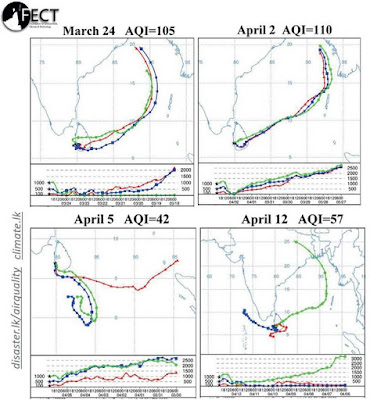Government Okays three new coal power plants CEA goes all-out to fight worsening air pollution
By Ifham Nizam
The Central Environmental Authority (CEA) and other stakeholders especially working for the betterment of energy efficiency would today (June 5) go all out to improve air quality in the country as the latest world Air Pollution Report has identified Sri Lanka as the 18th worst nation in terms of air pollution.
However, last week the Cabinet approved proposals for building three new coal power plants at Sampur and Norichchcolai and President Sirisena as the Environment Minister, too, gave his nod.
Plans are afoot to monitor continuously the dangerous particulate matter 2.5 and PM 10, from today (June 5) to coincide with the World Environment Day (WED). President Maithripala Sirisena will launch the programme.
Since 1973, the 5th of June every year is celebrated throughout the world as the World Environment Day pursuant to a collective decision made at the Environment Summit held in Stockholm in Sweden in 1972. Since then a comprehensive course of action is being taken by the UN Environmental Programme at global level relating to the field of environment.
Accordingly, a number of programmes have been lined up under the theme ‘Minimization of air pollution through Sustainable Forest Management’ in order to mark the World Environment Day which falls today.
This programme has been organized by the Central Environmental Authority and other related institutions in collaboration with the Ministry of Mahaveli Development and Environment as instructed by President Maithripala Sirisena in his capacity as the Minister of Environment and under the supervision of the State Minister of Environment, Ajith Mannapperuma.
Further expanding the country’s air quality programme implemented by the Central Environmental Authority so far, an atmospheric air quality examination in urban areas has been initiated. Under this new scheme, arrangements have been made to constantly examine the atmospheric air quality of the Battaramulla and Kandy areas and to keep the public informed on a daily basis.
Accordingly, arrangements have been made to officially declare open digitally the Air Quality Observation Centres stationed on the premises of the Central Environmental Authority at Battaramulla, the Kandy Central Bus Stand and in the Biyagama area around the Kelani Ganga, at the National function to be held at the Bandaranaike Memorial International Conference Hall under the aegis of the President.
The academic lecture will be delivered on this occasion by Dr. A.G.T. Sugathapala, Senior Lecturer, Faculty of Mechanical Engineering Studies of the University or Moratuwa on the topic "Air Pollution and its Adverse Impacts".
In addition to that, the publication ‘Hand Book on Air Quality Process’ and the ‘Sobaketha’ magazine containing articles on contemporary environmental themes will be presented to President Sirisena at this national function. Several Programmes have also been planned by all the Provincial and District Offices of the Central Environmental Authority under the World Environment Commemoration Programme implemented country wide. Under that, a number of programmes enabling the active engagement of the public have been lined up such as awareness creation among schoolchildren and other groups in various fields, tree planting campaigns, promotion of waste recycling etc.
Theme for the World Environment Day 2018 was "Beat Plastic Pollution". Now we are moving to another theme in 2019 which is "Beat Air Pollution". It’s not a bad idea to remind people that we are in multiple environmental crisis.
Global heating due to burning of fossil fuel such as coal and gasoline is yet an unbeatable task. The climate catastrophe is already rioting against the human population but all life forms are in a real mess due to this man made crisis.
According to the United Nations, nearly seven million people worldwide die prematurely each year from air pollution, with about four million of these deaths occurring in Asia-Pacific. Air pollution costs the global economy USD 5 trillion every year in welfare costs. Further, ground-level ozone pollution is expected to reduce staple crop yields by 26 per cent by 2030.
World Health Organisation (WHO) claims that 92% of the people in the World do not breathe clean air and around 8 million deaths annually can be attributed to air pollution with 4.3 million deaths from indoor air pollution and 3.7 million deaths from outdoor air pollution.
WHO recognizes that air pollution is a critical risk factor for no communicable diseases (NCDs), causing an estimated one-quarter (24%) of all adult deaths from heart disease, 25% from stroke, 43% from chronic obstructive pulmonary disease and 29% from lung cancer.
In Sri Lanka, more than 45 per cent of the admissions of children to hospitals are due to air pollution. It has also been estimated that 7,792 people died from air pollution-related disease and the rate is increasing each year. The top illness caused by air pollution is Ischemic heart disease.
In 2010, Evaluation and Research Unit, National Institute of Health Sciences, Ministry of Health, Kalutara, Sri Lanka concluded that "air pollution may be considered a neglected public health problem in Sri Lanka. (Y L Nandasena et al, 2010)
The Central Environmental Authority (CEA) has data upto 2012, however, National Building Research Organisation (NBRO) measure the ambient air quality at Colombo, Gampaha, Horana, Kaluthara, Rathnapura, Kandy, Kurunegala and Anuradhapura areas since 2012 with the support of the Vehicle Emission Testing (VET)Trust Fund of the Registrar of Motor Vehicles. Although there are some criticisms, VET programme is responsible for cleaning urban air in Sri Lanka.
When lawyer and environmental activist Lalanath de Silva filed a fundamental rights petition in the Supreme Court stating that the Minister of Environmental Affairs had not taken steps to control the air pollution in Colombo and that he and his family were deprived of the basic right to breathe clean air, the Supreme Court ordered that the Minister bring in these regulations to effect by June 2000. Although the regulations were gazetted, it was not effective until 2008 due to the delay by corrupt politicians.



Comments
Post a Comment